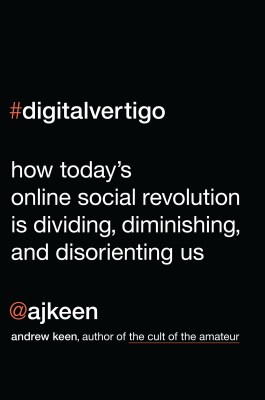Editor’s Note: The following is an excerpt from the book DIGITAL VERTIGO, authored by TechCrunch columnist Andrew Keen.
It occurred to me that the corpse might make more human sense after I’d expressed myself about it on Biz Stone’s Twitter where, as @ajkeen, I had a following of several thousand followers. Squeezing the rectangular BlackBerry between my fingers, I wondered how to socially produce my confusion about Bentham in under 140 characters. Turning away from the Auto- Icon, I noticed that the University College corridor was thronged with students walking to and from their afternoon classes.
As I watched this procession of strangers trooping across the Bloomsbury campus, I saw that some of them were glancing at me queerly, perhaps in a similarly foreign way to how I was peering at Bentham’s corpse. What impression, I wondered, did these students have of me— this globally networked yet entirely solitary stranger from another continent, determinedly anonymous in the metropolis, gazing with a detached intimacy at a pre- Victorian corpse.
My confusion about the dead social reformer drifted into a confusion about my own identity. Instead of contemplating Bentham’s exhibitionism, I began to consider my own personality in the order of things. How, I wondered, could I prove my own existence to my prized army of followers on Twitter, the vast majority of whom neither knew nor would ever know me?
Rather than using Twitter to broadcast my thoughts about the Auto-Icon or to confess what I’d had for breakfast that day (grilled kippers again— eaten at the chic Oxford prison) or to tell the world about my plans to look at the pictures in Amsterdam’s Rijksmuseum the following day, I went all Cartesian on my global audience.
I UPDATE, THEREFORE I AM, I thumbed onto “Tweetie,” an application on my BlackBerry Bold that enabled me to send a tweet anytime from anywhere.
These twenty- four characters of digital wisdom blinked back at me from the screen, impatient, it seemed, to be pushed out onto the network for the world to see. But my thumb hovered over the BlackBerry’s send button. I wasn’t ready to publish this private thought out onto the public network. Not yet anyway. I glanced down at my screen once again.
@ajkeen: I UPDATE, THEREFORE I AM
If these words were really true, I asked myself, then what? Would the entire world, all eight billion human beings, have to migrate— like settlers in a promised social media land—onto this new central nervous system of society? What, I wondered, would be the fate of our identities when we all lived without secrets, fully transparent, completely in public, within the social architecture that Reid Hoffman and Biz Stone were building for the rest of humanity? I looked again at the dead Bentham, the utilitarian father of the greatest- happiness principle. Would this electronically networked society result in more happiness? I contemplated. Would it lead to the improvement of the human condition? Would it enrich our personalities? Could it create man in his own image?
Questions, questions, questions. My mind drifted to the unwired, to those unwilling or unable to live in public. The thought triggered a feeling of dizziness, as if the external world had sped up and was now revolving quicker and quicker around me. If, as the fictional Sean Parker argues in The Social Network, our future will be lived online, I thought to myself, then what will be the fate of these dissenters, of those who don’t update? What, I wondered, in a world in which we all exist on the Internet, will become of those who protect their privacy, who pride themselves on their illegibility, who— in the timeless words of Brandeis and Warren— just want to be let alone?
Will they be alive, I wondered, or will they be dead?
